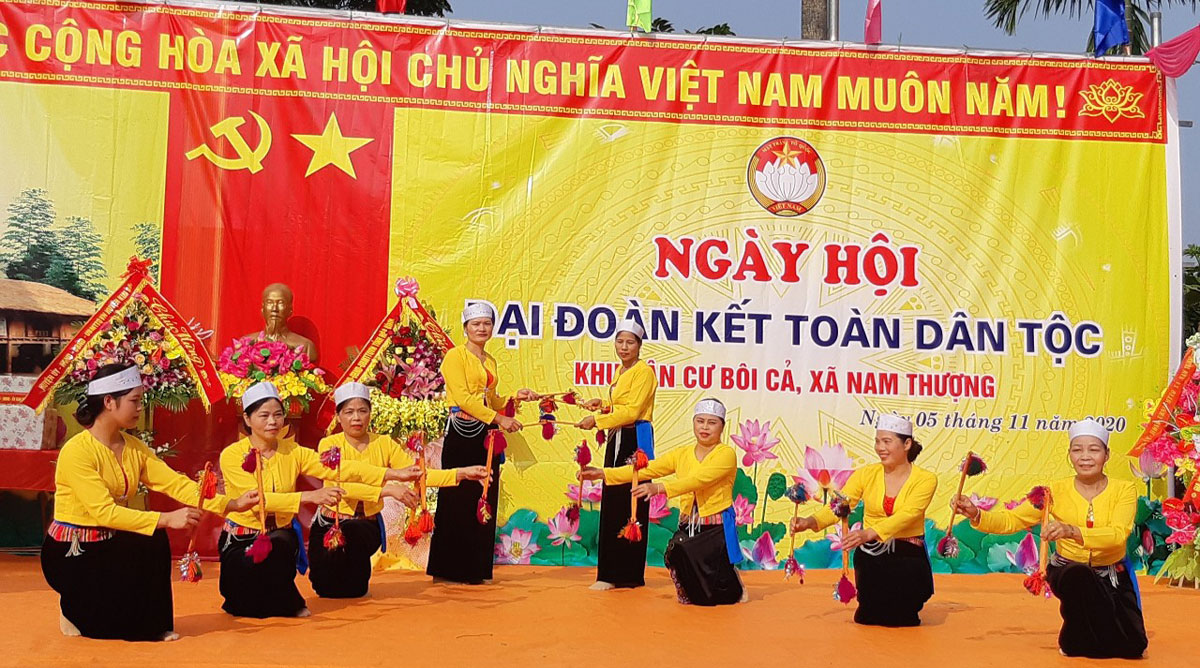
(HBO) – The national great solidarity festival was held in Boi Ca residential area in Nam Thuong commune in Kim Boi district on November 5. This is the first commune in Kim Boi district had hosted the event this year. The festival was attended by leaders of the provincial Fatherland Front Committee, provincial Ho Chi Minh Communist Youth Union and the district, and Presidents of the Fatherland Front Committees of 16 communes and towns in Kim Boi.
 Local people in Boi Ca residential area in Nam
Thuong commune stage art performance to welcome the national great solidarity
festival.
Local people in Boi Ca residential area in Nam
Thuong commune stage art performance to welcome the national great solidarity
festival.
Boi Ca has 362 families with 1,607 people, 92
percent of whom are Muong ethnic minorities. They have joined hands to
effectively carry out the campaign "The whole people unite to build new-style
rural areas and civilised urban area”. Along with shifting cultivation and
developing services, local people have paid due attention to outlining rational
planning as well as contribute to the construction of 0.9 kilometre of
rural roads and inter-field roads.
This year, local income per capita is estimated
at 40.5 million VND (1,749 USD), while poverty rate is expected to fall to 1.1
percent (four households). Some 81 percent of the households have solid houses.
In addition, all children in the residential area are enabled to go to school,
and there is no students dropping out of school.
Asmany as 292 households achieved the
"cultural family” title, accounting for 80.6 percent of the local families, and
the "sport family” title was bestowed on 58 percent of them.
Significant improvements have been seen in the spiritual
and material lives of local people.
The residential area also set up two
conciliation groups and one security group to promote solidarity and ensure
social order in the locality.
In 2021, the residential area expects over 85
percent of the households achieving the "cultural family” title, and will work
to carry out 27 criteria to build a cultural residential area.
At the festival, organisations, families and individuals
were lauded for their significant contributions to building the residential
area. A commitment to implement an emulation campaign in 2021 was signed as
well.
The district’s Vietnam Fatherland Front and provincial
Bank for Agriculture and Rural Development (Agribank) presented houses to two
impoverished families in the residential area./.
As a land deeply intertwined with human history and Vietnam’s millennia-long journey of nation-building and defence, Hoa Binh is often revered for its epic tales and legends.
Residents of Hoa Binh boast a rich cultural identity, reflected in their unique language, traditional attire, customs, and folk melodies – described as "sweet as honey, clear as a mountain stream.”
Lac Son district’s Vu ban town held the 2025 Truong Kha temple festival on April 12–13 (the 15th–16th days of the third lunar month). Since its revival in 2019, the festival has been organised every three years, preserving valuable intangible heritage while meeting the community’s cultural and spiritual needs.
The clothing of women reflects the culture of the Muong, Thai, Tay, Dao, and Mong ethnic groups in the northern province of Hoa Binh.
Gongs hold a special place in the cultural and spiritual life of the Muong ethnic people in Hoa Binh province. More than musical instruments, they are an indispensable part of community rituals and collective memory, echoing through generations as a spiritual thread linking the past, present, and future.
Preserving and promoting the cultural values of the Muong ethnic group has become an urgent task in the current context, as many traditional values face the risk of fading away. This effort requires not only protecting the cultural identity but also eliminating outdated customs and developing a modern cultural lifestyle, contributing to sustainable values for the Muong community in Hoa Binh province.
The Muong ethnic culture, deeply rooted in Vietnam’s mountainous north, continues to be preserved and revitalised by dedicated individuals and communities determined to safeguard their ancestral identity.



 Local people in Boi Ca residential area in Nam
Thuong commune stage art performance to welcome the national great solidarity
festival.
Local people in Boi Ca residential area in Nam
Thuong commune stage art performance to welcome the national great solidarity
festival.